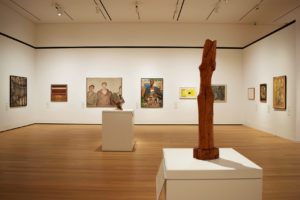HANNAH KAZIS-TAYLOR
Dungeons and dragons and dealing with death
After her younger sister Tilly dies, “perfectly normal” school teacher Agnes regrets that she never bothered to get to know the nerdy girl obsessed with fantasy games. Curious about who her sister really was, Agnes decides to enter the game world Tilly left behind, embarking on a Dungeons & Dragons adventure with Tilly’s partners and the game version of Tilly herself.
Average Agnes (Delilah Napier ‘19) finds herself feeling, probably for the first time in her life, out of place among Tilly’s (Anna Blech ’19) band of magical friends. After renaming Agnes with a suitable D&D title and arming her with a beginner-level sword, the team sets out on their adventure.
The set, designed by Adam Lessing ’19, and sound, by Declan Kunkel ’19, make the play world surge to life. Previously white screens flash with colors, and, at the D&D master’s request, suspenseful music sets the mood. The fantastically composed video game-themed score reemerges with variations throughout the show, creating, in concert with the stylized costumes, a distinct world of magical heroes and villains. This game world is as vibrant as the real one is bland.
Girls dominate the game world. They’re hot, they wield their magical weapons with menace and they don’t let anybody mess with them. When a man flirtatiously approaches Farrah the fairy (Madeleine Hutchins ’19) she puts him in his place:
“Did you see a sign that said petting zoo?”
“No.”
“So please don’t try to fucking touch me.”
Moreover, the magical characters are gay. We learn that Tilly had spun this fantastical world not only for the fun of the heroic quests but also to find the acceptance her high school world lacks. In their game world roles, Tilly and her friends assume a dimension of confidence and conviction their misfit real-world selves simply do not have. They are as at home in this world as Agnes is back in reality.
The queer narrative was refreshingly subtle, at first. Agnes and Tilly, however, detract from the nuance by vocalizing a series of cliches about closeted gay teenagers. The sisters act out their surprise, discomfort and confusion; the script’s heavy-handed tropes simplify what had been previously a more interesting dynamic. The play misses an opportunity for a more sophisticated account of a queer teenage story.
The emotional weight of this surprisingly comedic play hits hard when the characters reach the end of the script Tilly had finished before she died. Though the game continues for a bit, Agnes realizes an important truth: Tilly’s virtual life, and the sisters’ budding relationship, will come to an abrupt end. Agnes finally feels the loss of her sister, after losing her for the second time.
I didn’t want the game to end either. Agnes’s life, as she notes regretfully at the beginning of the story, is boring. Her boyfriend shows himself to be insensitive, uninspiring and unromantic. Her best friend is an amusing but uncaring and tactless high school guidance counselor. When the game is over, Agnes seems to ask the question we would have expected at the start of the play, when she hears that a car crash has killed her immediate family: What do I have left?
Regrettably, Agnes comes to an unsubstantial emotional reconciliation at the end of play. She concedes that she never truly knew her little sister, which is obvious by this point, and finds surprising solace in meeting the real-life versions of the characters in Tilly’s game world. This happy blandness simply doesn’t to the story justice.
Is Agnes disappointed with her milquetoast boyfriend, now announced to be her fiancé, in comparison to Tilly’s passionate love for her girlfriend played out in the game? Can she ever fully exit from the world in which her sister lives on? Is there a sinister side to her emotional tumult in a relationship constricted to an imaginary word?
The plot was more or less predictable from the start of the story, but the superb design more than compensated for the simplicity — I cannot imagine a better realization of the script. Perhaps, like Agnes I am simply unsatisfied with a premature end to the drama and romance of the game world.
April 8, 2016










